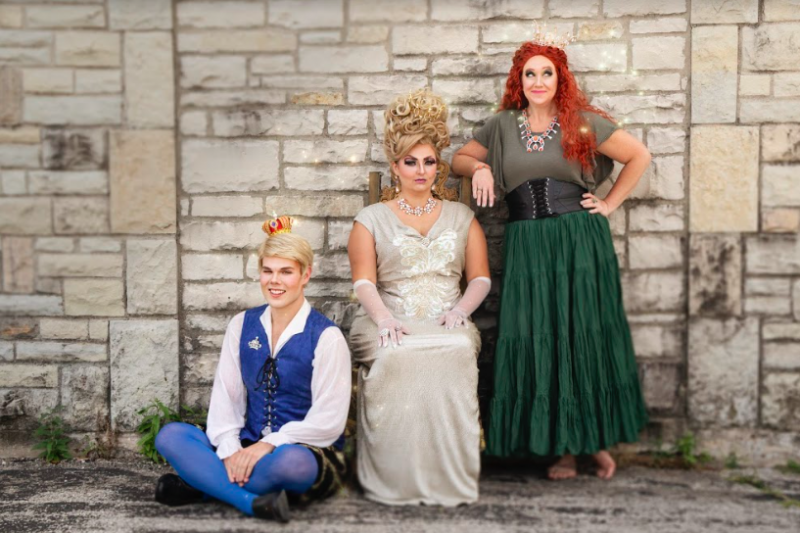BWW Preview: ASL-Interpreted Performance of ONCE UPON A MATTRESS Puts Inclusion First at Theater RED

Make way for a magical collaboration between Milwaukee's Theater RED and Carroll University! Under the direction of Theater RED's Eric Welch, some Milwaukee's on-stage favorites are teaming up with students from Carroll's Theatre and Arts Management Program for Once Upon a Mattress, a musical retelling of the classic fairytale The Princess and the Pea. There will be six shows between the weekends of November 15th and 23rd, but it's the Saturday, November 16th performance that is sure to charm audiences in a special way.
For this Saturday's performance, Theater RED and Carroll University will join forces with the University of Wisconsin-Milwaukee's American Sign Language/English Interpretation Program to become a veritable triple threat. Says Theater RED co-founder and Once Upon a Mattress Producing Director, Marcee Doherty-Elst: "This is the first time Theater RED has had American Sign Language (ASL) interpreters at a performance, but it has been something I have been wanting to do for some time."
So how did this all come about? Doherty-Elst reached out to Pamela Sue Conine in the ASL/English Interpretation department at UWM to learn more about interpreting resources in Milwaukee. In chatting, the two realized Once Upon a Mattress, which was already partnering with Waukesha's Carroll University, might be a good chance for some UWM students to get involved, too. Conine put out a call and two students answered. "We are very grateful to UWM, especially to Jaclyn Gill and Ellie King, our student interpreters, for sharing their time and talents," says Doherty-Elst.
The stars seemed to have aligned for Gill, King, and Theater RED. Turns out, the two student interpreters will be signing for the very same musical at a local high school the weekend before Theater RED kicks off their run. Because of that, Gill and King already have some familiarity and practice with Once Upon a Mattress. The two have stayed after rehearsals to talk with the actors, learning each character's sign name and gleaning insight into the on-stage personalities.
So does the scripted nature of theater make ASL interpretation easier? Gill, a senior at UWM, says it isn't necessarily easier - "but we were able to put in many hours of preparation and practice; you can't always do that. We went to ASL experts within our university. We sat down with our Deaf professors and language coaches, and they worked with us on lines and helped us understand the Deaf perspective of what we are signing to help us become more clear. By having the privilege of having Deaf professionals and language coaches, we were able to see a more authentic version."
Gill goes on to say how grateful she is that the ASL/English Interpretation program at UWM helps students try new things. "Theater was something I never thought I would do until I tried it once last year," she says. "Interpreting Once Upon a Mattress and trying to provide access without request is something I hope to see in all communities. Deaf individuals deserve access everywhere - to have the ability to go to plays, concerts, or workshops without having to contact many people and advocate for themselves to have interpreters."
Theater RED certainly shares Gill's view. "Theater companies have a responsibility to lead by example, not by exception," states Doherty-Elst. "I made up my mind that I was going to have an ASL-interpreted performance because I felt it was important to do so. I needed to do my part to grow and expand inclusion in the arts."
But knowing the right thing to do is only the first step. According to Professor James Zager, Producing Liaison for Carroll University, "Knowing about a problem is not the same as fixing it. It really comes down to expanding resources." Doherty-Elst agrees: "Organizations need resources. As a small business owner, I truly understand that. So I focused on how I was going to accomplish an ASL-interpreted performance with the resources I had. Those resources are going to be different for every organization."
What makes Once Upon a Mattress a fun choice for Theater RED's first ASL-interpreted show is that there is actually a non-speaking character in the lineup. Due to a rotten curse, King Sextimus, played by Robby McGhee, communicates through gestures (not ASL). "These moments are favorites of mine," notes Doherty-Elst. "Not only because Robby is a really funny actor, but because when he's 'talking,' the differences among us disappear. Whether we are deaf, hard of hearing, or not, we are all hearing the same way when King Sextimus is 'speaking.' To me, those moments are unifying and an important reminder of how much we all have in common despite our differences."
The ASL-interpreted performance of Once Upon a Mattress will be held Saturday, November 16th at 7:30 PM at Carroll University's Otteson Theatre in Waukesha. Non-interpreted performances run from Friday, November 15th through Saturday, November 23rd. Information and tickets at theaterred.com.
Photo credit: Traveling Lemur Productions
Comments

Videos

